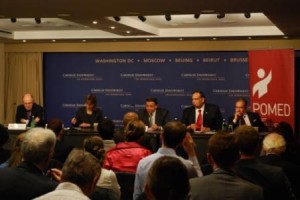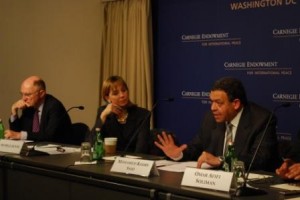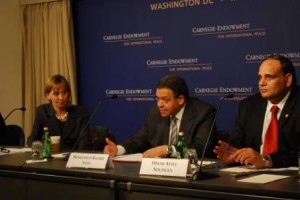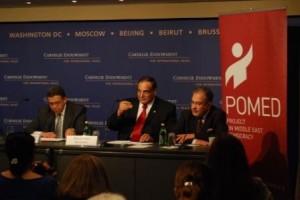Supporting a Democratic Transition in a Post-Gadhafi Libya: What Can the U.S. Do?
On Thursday, the Project on Middle East Democracy (POMED), in partnership with Libya Outreach, the Libyan Council for North America, and the Libyan Emergency Task Force hosted an event entitled “Supporting a Democratic Transition in a Post-Gadhafi Libya: What Can the U.S. Do?” Stephen McInerney, POMED’s Executive Director moderated the event. The panelists were: Manal Omar, Director of Iraq, Iran, and North Africa Programs, Center for Post-Conflict Peace and Stability Operations, United States Institute of Peace; Hafed Al-Ghwell, Libya Outreach Group; Amira Maaty, Program Officer, Middle East and North Africa, National Endowment for Democracy; and Christopher Blanchard, Middle East Policy Analyst, Foreign Affairs, Defense, and Trade Division, Congressional Research Service.
Notes on the event are located below or can be accessed in PDF form here.
Christopher Blanchard, speaking in his official capacity, began his remarks discussing the halting transitions within Libya that had begun under Moammar Gadhafi. He noted that significant opportunities remain in Libya for social and economic development. He stressed that the vital decisions about security, cease fire, terms of justice, etc will be made by Libyans, not outside powers, but the U.S. and other international partners can assist in the decision making process. Blanchard specifically cited items that Congress can do to help including:
- Encourage the Obama Administration to show results in their aid packages
- Allocate humanitarian and security assistance
- Assist in funding international peace keeping missions and other international operations
- Lay the ground work and follow through on longer term economic and trade partnerships
Blanchard also cited human resource development as a critical challenge facing Libya. He noted other serious complications that will need addressing, including: damage to key infrastructure, the exodus of skilled foreign oil workers, immediate conflict resolution needs regarding participation during the conflict, the need to build experience living in an open society, the need to define terms of representation in Libya (i.e. rural vs. urban, poor vs. wealthy), and the need to determine terms of participation and accountability for former regime officials.
The discussion turned to Manal Omar, who spoke in a personal capacity, but who has recently returned from Benghazi. She noted the strong discussion about the role of civil society in post-conflict Libya, including the establishment within the Transitional National Council (TNC) of a Public Engagement Committee. She also noted the Islamic character of Libya and the importance of incorporating religion into the new government in a manner that is in line with democratic best practices.
Omar described four ‘lessons learned’ from the Iraq experience that must be implemented to prevent similar problems in Libya. These lessons include:
- Avoiding early elections because early elections fueled divisions within Iraq
- Including former regime elements to prevent divisive witch hunts, she cited South Africa’s truth and reconciliation process as a model, but good leadership and a good, trusted transitional justice system are critical
- A focus on women is required and necessary, but not one focused on women’s ‘liberation’
- A need for basic services across the country, in addition to the political needs
Omar noted hopeful differences between Iraq and Libya relating to territory and the indigenous TNC.
Hafed al-Ghwell spoke of specific items that the U.S. is capable of doing to help the Libyan transition including:
- Providing the right set of technical help and expertise in institution building
- Make human rights an issue that is publically addressed with any future government
- Encourage the development of a robust private sector
He also noted a lack of international understanding about the depth of social, political, and security fragmentation within Libya caused by Gadhafi. Al-Ghwell specifically cited the issue of personal property as being a critical issue in the reconciliation and compensation process. This stems from a 1970/80’s directive from Gadhafi for all people to move into vacant or empty homes nearby as part of his political ideology. Al-Ghwell also noted the need for any future political system to be anchored in the culture of Libya; however, international partners can assist by insisting on transparency, inclusion, and systemic accountability.
The final panelist was Amira Maaty. Maaty discussed positive reports of civic and political engagement in Libya. She noted a need for international technical assistance in several areas including: political and good governance, constitutional assistance, legal and regulatory reforms, independent and professional media, and monitoring and defending journalist’s rights. She noted that an accountable transitional justice system, with “public buy-in,” is critical, as well as the need for security sector reform.
Matty closed her remarks discussing the need for dialogue about the proper sequence and the establishment of priorities for change in Libya. She noted the need to build institutions with a solid foundation and the need for independent think tanks.
The event concluded with a Q&A session. Christopher Blanchard noted that the degree of unity within Libya is still unknown and will ultimately be determined by how the conflict ends. Amira Maaty and Hafed al-Ghwell noted the critical role that youth play in the revolution and that they will play a critical role in strengthening civil society. Al-Ghwell also noted the need to incorporate newly armed and battle hardened groups into the post-conflict Libya. Many of the panelists described the post-Gadhafi situation as being entirely dependent on how the violence ends.
Manal Omar noted a widespread awareness of the need to avoid tribalism. She is encouraged by discussions currently taking place within Libya to this effect. The panelists also discussed the lack of legitimacy that the African Union holds in the eyes of many Libyan people and the need for any economic development assistance to be tied to job creation and growth.



